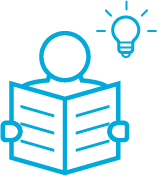


The present study focused on how does the young child become excited about reading. The number of books at home, library visits, and the type of reading modelled by the parents are all important, as well as shared reading with the child. However, the child’s independent reading is the most important thing.
Authors: Marja-Kristiina Lerkkanen, Jenni Salminen, & Eija Pakarinen
Source: Lerkkanen, M.-K., Salminen, J., & Pakarinen, E. (2018). Varhaislapsuuden lukuhetket tukevat lukutaitoa. Onnimanni, 1-2, 20-26.
How does the young child become excited about reading? According to our research, the home environment has an effect. The number of books at home, library visits, and the type of reading modelled by the parents are all important, as well as shared reading with the child. However, the child’s independent reading is the most important thing.
What is the home literacy environment (HLE)?

The study
Here, two studies are presented about the HLE of children aged 2–3 years and 6 years old and their pre-reading skills.
Participants in the first study were 208 parents who reported their HLE practices with their 2–3-year old children. The second study consisted of 536 children aged 6 years old and 362 parents who reported the HLE and child’s pre-reading skills.

Findings

How parents can support their child’s reading skill development
What are the benefits of reading to a child?